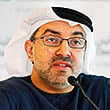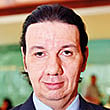13 deceased donors among those who saved 40 lives in UAE
17 organ transplants took place by the end of 2018 in Cleveland Clinic Abu Dhabi alone

Abu Dhabi: Thirteen deceased donors were among those who provided a fresh lease of life to over 40 patients in the UAE since March 2017 when a presidential decree on transplants came into effect, top health officials said in the capital on Tuesday.
“Families of 13 deceased donors in the country consented to donate organs in their moments of grief, and their generosity gave a new lease of life to patients. We would like to praise their humanity and call upon more individuals in the UAE to have organ donation conversations with their families,” Dr Ali Al Obaidli, chairman of the UAE’s National Transplant Committee, told Gulf News.
He was speaking at a special event at the country’s only multi-organ transplant facility, the Cleveland Clinic Abu Dhabi, where 17 transplant procedures were conducted with solid organs from deceased donors by the end of 2018.
Surveys have shown that 68 per cent of our population is willing to donate organs. In any case, organs are viable for harvesting in only 1 per cent of mortalities. So as we have urged in the past, it is imperative to inform one’s family if a person wishes to donate organs.

Shaikh Nahyan Bin Mubarak Al Nahyan, UAE Minister of Tolerance, also commended the families of the deceased donors.
“[This] is a celebration marked by paradox. While we celebrate the continuation of life made possible by the generosity of donors, we also mourn the loss of those donors who have passed from this life,” he said.
The UAE currently has four transplant centres, but it does not yet have a donor registry, or any other way of identifying whether an individual is a willing organ donor.
“Surveys have shown that 68 per cent of our population is willing to donate organs. In any case, organs are viable for harvesting in only one per cent of mortalities. So as we have urged in the past, it is imperative to inform one’s family if a person wishes to donate organs. Families then go on to respect these wishes, increasing our pool of organ donors,” Dr Al Obaidli added.
Besides the 17 transplant procedures that took place with organs from deceased donors at the Cleveland Clinic Abu Dhabi, 18 transplants were also conducted between living relatives. The procedures included three heart transplants, three lung transplants — including a double-lung procedure, 10 liver transplants and 19 kidney transplants. Eight more transplants were completed at the hospital this year.
Setting new milestones, six transplant operations were performed in six days last October, besides three transplants between related living donors this week. This would be a feat even for well-established transplant centres which usually undertake one living related transplant a week, said Dr Rakesh Suri, chief executive officer at the Cleveland Clinic Abu Dhabi.
Dr Al Obaidli said work is currently underway to train intensive care unit medical staff in hospitals across the country.
“With such training, we can ensure that standard procedures are followed for organ harvesting, further increasing our stream of donor organs,” he added.
Meet the grateful patients
Zuhoor Al Ameri
The 45-year-old Emirati suddenly developed kidney disease, and the condition left her in much pain and discomfort.
“It seems simple but I could not even drink water to my heart’s content. I had to melt ice chips in my mouth. And I could not have bread because the little salt it had was bad for me. It was a difficult five years for me, and I feared that I would have to undergo dialysis,” Al Ameri said.
My life is nothing like it used to be, and I am tremendously grateful to the UAE leadership for establishing and enhancing this robust organ transplantation programme

But just as Al Ameri’s condition began to worsen, a kidney from a deceased donor became available. She underwent a transplant in late 2017, becoming one of the first recipients of an organ from a deceased donor in the UAE.
“My life is nothing like it used to be, and I am tremendously grateful to the UAE leadership for establishing and enhancing this robust organ transplantation programme,” she said.
Hazem Abdul Kader
“Mine was an extremely rare case of autoimmune hepatitis. The condition of my liver began to deteriorate at a rapid pace four years ago, even though I didn’t have any noticeable symptoms,” said Hazem Abdul Kader, a 45-year-old health-safety-environment consultant from Egypt.
I would like to thank the family that donated their relative’s organ to me. I am eternally grateful to them, as I am to the UAE leadership and the doctors at Cleveland Clinic Abu Dhabi

“I have two young children, aged 10 and 14, and I wanted to stay healthy to take care of them. I was told I had to have a liver transplant but there were no donor matches in Egypt,” said Abdul Kader, the breadwinner of his family.
However, the liver of a deceased donor became available in the UAE just as Abdul Kader was hospitalised in June 2018.
“I would like to thank the family that donated their relative’s organ to me. I am eternally grateful to them, as I am to the UAE leadership and the doctors at Cleveland Clinic Abu Dhabi,” he said.
Rahima Abu Eida
As far as transplants go, Rahima Abu Eida’s procedure was a particularly complicated one.
I may never meet the family who chose to grant me these organs, but I want to thank them from the bottom of my heart

The 49-year-old Palestinian had been strapped to an oxygen machine for four years, and had no quality of life.
“I had to use a wheelchair, and could not perform any regular daily activities,” the mother-of-six said.
When the lack of oxygenated blood began to affect Abu Eida’s heart function, doctors said she would not survive more than a year without a lung transplant. Four months after being placed on the waiting list, a deceased donor’s organs became available, and Abu Eida was selected for the UAE’s first double lung transplant.
“I may never meet the family who chose to grant me these organs, but I want to thank them from the bottom of my heart,” Abu Eida said.
Sultan Al Muhairi
Sultan Al Muhairi had been living with heart failure for eight years, and the condition tired him out so much that he eventually quit his engineering job last year.
“I was always exhausted, and it was difficult to even move from one place to another,” the 38-year-old said.
Fitted with a pacemaker, he eventually need a left ventricular assistance device (LVAD) to help his heart pump blood. Even then, he fell ill last October when a clot developed in his LVAD.
His deteriorating condition placed him on top of the transplant list, and he underwent a full heart transplant in October 2018.
“Every day, I listen to my heartbeat now and I think of the people who made my life possible. I am very thankful,” he added.
Sign up for the Daily Briefing
Get the latest news and updates straight to your inbox



